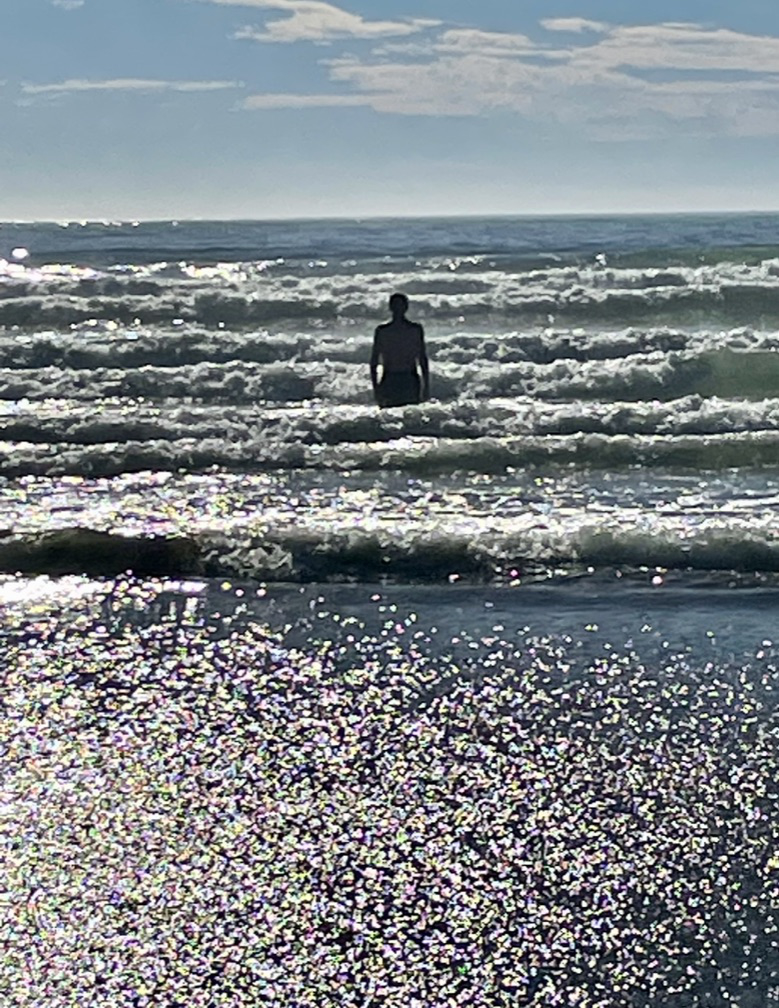Everything Not Forbidden Is Compulsory
In movies, there’s the iconic shot of a lone person wading into a vast glittering ocean, a resolute body consigning itself to the sea. But on that sunny evening at Chesterman beach, my brother Geoff wasn’t seeking death. He was snatching life.
As I watched his skeletal, beaded body creep back out, my throat constricted. I should have gone in with him. We could have held hands the way we did twenty-five years ago in Santa Monica: Bruce, me, Geoff and David, delivering our mother’s ashes into the wintery Pacific. I tried to swallow. What if this was his last time? Geoff, three years younger, the brilliant physicist with the opaque face, has been diagnosed with Parkinson’s. He’s losing things. Like his body.
What holds a family together? Words, of course. Touch, tending, attending. But I come from a family of stoics, brainy, bristly, distracted stoics. As Bruce said, raised by wolves. And too early, our pack fell apart: the father left home, the mother had a nervous breakdown, and as they could, the four children slinked away. The family bond was a tattered rag.
And yet, over the years, the four children gathered up the tatters. Clumsy and conflicted, we started showing up in Santa Monica to visit our eroded mother. Sometimes it was fun. After she died, we kept showing up.
Geoff was never easy for me. He was silent. He stared. He was smarter than me – smarter than everyone. And he was one of the boys. I thought he looked down on me; Bruce thought he was arrogant. What he was was angry, without the means to express it, but we didn’t know that. Did he?
Yet Geoff could laugh. We all could. Two years ago, at a picnic table in the sunlit hills of Bonny Doon – grassy meadow, redwood gully, the shining Pacific far below – Geoff told about getting the diagnosis. My doctor asked if my expression had become more fixed, he said and we all just guffawed. How could you tell? we asked.
Rifts had been healed by then. We’d made it sweet to be together.
Water. The Earth’s treasure. Our tattered bond had never let go because our bond was water. I don’t mean rivers. Not lakes or ponds, creeks or streams; not canals, sloughs, sounds, lagoons – though Geoff will jump into most water he comes across. Georgia Strait, the Puget Sound. Laguna Creek and Wenatchee River. Egg Lake on San Juan Island. Geoff, who lives in Norway, dipped into the frigid Oslofjord year round. When I visited, I watched his strong, sturdy farmer’s body plunge into Lofoten’s Norwegian Sea and Finnmark’s Varanger Fjord. In Nags Head and Key West, we swam in the greenish Atlantic, and of course we swam in the shifting Pacific, gunmetal in Santa Monica, turquoise at Anahola Beach, and at Monastery Cove, where David held birthday parties, sea green. Our bond was the Pacific Ocean.
As children, it was as if our animal spirits resided there. We became invincible at the beach, riding waves and spitting saltwater. Diving under breakers like little brown dolphins.
Last August, Geoff invited me to join him and his family on a visit to Vancouver Island. On the day they were going whale-watching, I decided to drive west. I’d heard Tofino was worth the three-hour trip, and I wanted to see the Pacific. After thinking it over – Geoff does not act on impulse, except when it comes to love – he decided to come along.
Peeling wooden shacks, take-out joints, store-front what-nots, and red geraniums: We’d had no idea Tofino would be a beach town. Perched on the flank of Vancouver’s Great Bear rainforest, this little beach town was not only out of place, it was out of time, sporting black-rubber surfers and rusting green Vanagons. We sat in the sun eating burritos and drinking beer, and Geoff, staring at me, said, You like this.
I do, I said. He nodded.
Then we headed out to Chesterman Beach, and Geoff stripped down and waded in. And I stood watching, wishing I’d gone in with him.
Time’s getting short, and things have gotten simple. On the dark drive home, I navigated between shadowy forest giants while Geoff, his face pearly in the light of the dashboard, taught me physics, starting with the Murray Gell-Mann totalitarian principle.

Patricia Canright Smith is a writer living outside Seattle, a retired psychotherapist with advanced degrees in psychology and art. Her work has appeared in many literary journals, including a Notable Essay in 2014’s Best American Essays. She’s recently begun collaborating with Paul Finley, jazz musician, to create duets.

